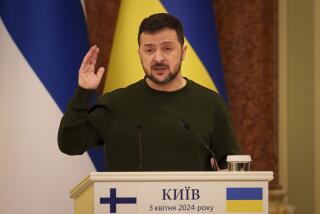Czech Revolution: A Secret Police Plot? : Intrigue: The BBC says leaders of the KGB and its Prague counterpart engineered the uprising ending Communist rule.
LONDON â The peaceful revolution that swept away Communist rule in Czechoslovakia six months ago was engineered jointly by leaders of the secret police in Moscow and Prague, the British Broadcasting Corp. has reported.
A BBC television documentary contends that secret police leaders in both the Soviet Union and Czechoslovakia conspired to bring down the hard-line Communist leadership in Prague because it rejected Mikhail S. Gorbachevâs reforms in the Soviet Union.
The plotters planned for more reform-minded Communists to replace the hard-liners but miscalculated the depth of public desire for change, said John Simpson, the BBC foreign affairs editor.
The 50-minute news program, âCzech-Mate: Inside the Revolution,â was broadcast on BBC-TV late Wednesday.
According to the broadcast, Milan Hulik, an investigator for the Czechoslovak parliamentary commission probing the plot, said that is not yet known if the revolution was instigated by the Czechoslovak secret police or the Soviet KGB.
âBut all the facts point to KGB connivance,â he said. âWe cannot reach any conclusion other than that the whole affair had been given the blessing of the Soviet political leadership.â
The plotters on the Czechoslovak side are now under investigation and some are in prison, charged with misusing their positions as public officials, while a parliamentary inquiry into the plot continues, Simpson said.
(In Prague on Thursday, police chief major Pavel Hoffman said that secret police headquarters have been put under special protection after a heated debate by several dismissed agents ended up in personal threats.)
Simpson said the spark that ignited the Czechoslovak plot was the erroneous report of a death of a youthful demonstrator during an officially sanctioned march in Prague on Nov. 17. The demonstration was held to mark the 50th anniversary of the murder of a Prague student by Nazi troops in 1939.
The plotters believed that a death during the November commemoration âwould provoke a hostile reaction,â Simpson said.
According to the BBC report, several thousand young demonstrators were lured into a narrow street leading to Wenceslas Square by Lt. Ludek Zivcak, a secret policeman who had infiltrated the student movement.
The documentary showed a photograph of Zivcak apparently urging the marchers to take the narrow street that had not been part of the original route of the demonstration.
Once in the street, marchers were hemmed in by police and brutally beaten. About 560 people were injured.
Zivcak fell to the ground, his body was covered with a blanket and an ambulance took the body away. The event sparked rumors that riot police had beaten to death a student named Martin Smid.
In the days that followed, people poured into Wenceslas Square in the heart of the capital to mourn the death. And the protests continued to grow.
Demonstrations continued even after the only two students named Martin Smid at Prague University were shown to be alive.
The protests finally brought about the downfall of hard-line President Gustav Husakâs government, the creation of Czechoslovakiaâs first non-Communist government in 40 years and the election as president of playwright Vaclav Havel, the countryâs best-known opposition figure.
Simpson said the chief plotters were the Czechoslovak secret police chief, Gen. Alois Lorenc; the KGB head in Prague, Gen. Teslenko (first name not given), and KGB deputy chairman Gen. Viktor Grushko.
He said the plotters monitored the Nov. 17 demonstration together in Prague and that Grushko returned to Moscow the next day.
The plottersâ candidate to replace Communist Party chief Milos Jakes was Zdenek Mlynar, who had been a leading figure in Alexander Dubcekâs doomed reform government in 1968.
Mlynar, a friend of Gorbachev when they were law school students together in Moscow, had been purged by his own Communist leaders in 1969.
But Mlynar did not want the job when it was proposed to him, the BBC said, and Havel and his non-Communist Civic Forum were ushered into power by popular acclaim.
More to Read
Sign up for Essential California
The most important California stories and recommendations in your inbox every morning.
You may occasionally receive promotional content from the Los Angeles Times.









